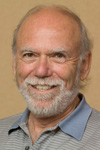Director's Corner
31 May 2007
 Barry Barish |
MAC review of global ILC R&D programme
During the ILC reference design phase, leading up to the Reference Design Report (RDR), the International Linear Collider Steering Committee (ILCSC) appointed a Machine Advisory Committee (MAC) to provide technical reviews of our work. This committee has been very busy, meeting four times in a little over a year first to review progress in producing the RDR for their first three meetings. The committee recently held their fourth meeting on 26-27 April to review the plan for research and development (R&D), which will be necessary before the start of ILC construction. Their report from this recent meeting has just been issued. The report and our point-by-point responses will be presented to ILCSC on 1 June. This was the last scheduled meeting of the present MAC as charged in their mandate, although I fully anticipate that a new form of a MAC or technical advisory committee will be formed by the ILCSC to monitor our progress during the engineering design phase.
The GDE presentations were organised by Bill Willis, who chairs our R&D Board. The MAC report is generally positive about our programme, and it endorses the approach Bill outlined for collecting R&D items as proposed by the collaborators, categorising them, prioritising them, and seeking contact with funding agencies to provide guidelines for funding. The report acknowledges that this approach is working and that the areas where R&D is needed have been successfully identified. They also acknowledge the growing links between GDE R&D coordination and the funding agencies. In addition, collaborations are becoming more effective in sharing the work and avoiding duplication.
On the other hand, they note that the process of involving the worldwide funding agencies in supporting a well-balanced worldwide R&D programme is still incomplete, and they encourage ICFA and ILCSC to use their influence to help mitigate the difficult situation in parts of the global collaboration. We support this recommendation and also encourage ICFA and ILCSC, as well as FALC to help in this regard. We understand that a balance must be found between regional and laboratory interests and those of the GDE, but it is crucial that, with limited resources, the key R&D issues receive the necessary coordinated support.
The MAC report also makes several comments and recommendations regarding the GDE and its R&D programme, including the following:
- We should make our process of prioritising the worldwide R&D programme more transparent.
- The MAC expressed concern regarding the flat or even decreasing funding profile in Europe and encouraged the European ILC collaborators in their efforts to obtain FP7 funding for ILC activities.
- The MAC expressed their hope that CERN involvement in the ILC will continue, at least in the form of making use of the synergy between ILC related R&D activities and the design and R&D work for other plans and projects, as well as by making CERN expertise available for ILC related R&D. We strongly support this important recommendation and note the importance of collaborating with CERN.
- The report concluded that a rich programme is developing in Asia, with growing contributions from Korea, China, and India. However, they encouraged stronger coordination of Asian activities to prevent the development of duplication and gaps in the R&D programme.
- They also made important points on the technical part of the programme, in particular: on the importance of damping ring R&D programme on electron cloud issues; on the broad world wide effort by our S0 and S1 taskforces, which have the goal to provide an 80% yield of cavities which provide a gradient of 35MV/m; and gave support to the ILC S2 programme goal to conduct a full-scale RF unit string test. However, they expressed the view that the necessity for testing the exact ILC system is overemphasised.
We will discuss and respond to these points and others at the coming ILCSC meeting. I would like to close today by especially thanking the members of the MAC and their chair, Ferdinand Willeke, for their very constructive efforts over the past year, which was often difficult due to our fast evolving programme. These reviews and reports have been of great value to us, and having a mechanism of technical review is essential for the integrity of our work.
-- Barry Barish
